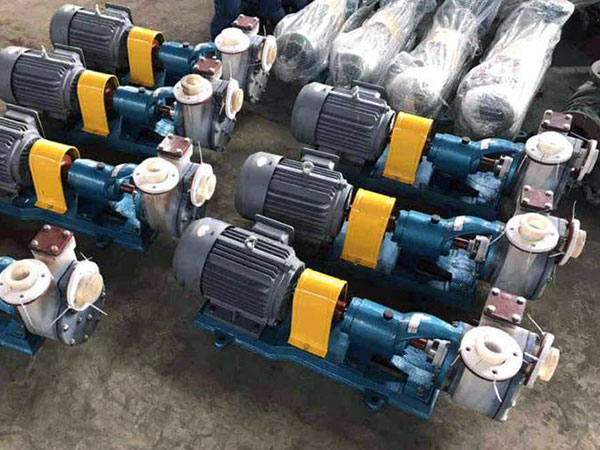1. Sulfuric acid
As one of the strong corrosive media, sulfuric acid is an important industrial raw material with a wide range of uses.
Sulfuric acid with different concentrations and temperatures has a great difference in the corrosion of materials. For concentrated sulfuric acid with a concentration above 80% and a temperature below 80°C, carbon steel and cast iron have better corrosion resistance, but it is not suitable for high-speed flowing sulfuric acid. It is not suitable for pump and valve materials; ordinary stainless steel such as 304 (0Cr18Ni9), 316 (0Cr18Ni12Mo2Ti) has limited use for sulfuric acid media. Therefore, pumps and valves for transporting sulfuric acid are usually made of high-silicon cast iron (difficult to cast and process) and high-alloy stainless steel (alloy No. 20), but they are difficult to process and expensive, so they are not favored by people.
Fluoroplastic alloy has very good resistance to sulfuric acid. It is a patented material of Shanghai Institute of Organic Chemistry, Chinese Academy of Sciences. It has been proved by the experiment of Chinese Academy of Sciences that there is no chemical medium that can react with it. Therefore, the fluorine-lined pump (F46) is used A more economical option.
2. Hydrochloric acid
Most metal materials are not resistant to hydrochloric acid corrosion (including various stainless steel materials), and ferrosilicon containing molybdenum can only be used for hydrochloric acid below 30% at 50°C. Contrary to metallic materials, most non-metallic materials have good corrosion resistance to hydrochloric acid, so lined pumps (such as engineering plastics, fluoroplastics, etc.) are ideal for transporting hydrochloric acid.
3. Nitric acid
Most general metals are rapidly corroded and destroyed in nitric acid. Stainless steel is a widely used nitric acid-resistant material. It has good corrosion resistance to all concentrations of nitric acid at room temperature. It is worth mentioning that stainless steel containing molybdenum (such as 316, 316L ) The corrosion resistance to nitric acid is not only not better than that of ordinary stainless steel (such as 304, 321), sometimes even worse. For high-temperature nitric acid, fluoroplastic alloy materials are usually used.

4. Acetic acid
It is one of the more corrosive substances in organic acids. Ordinary steel will be severely corroded in acetic acid of all concentrations and temperatures. Stainless steel is an excellent material for acetic acid resistance. Molybdenum-containing 316 stainless steel is also suitable for high temperature and dilute acetic acid vapor .
High-alloy stainless steel or fluoroplastic pumps can be selected for high-temperature, high-concentration acetic acid or other corrosive media. Such as CQB magnetic pump, CQ stainless steel magnetic pump, etc.
5. Alkali (Sodium Hydroxide)
Generally, the corrosion is not very strong, but the alkali solution may crystallize due to seasonal changes and specific gravity, so IHF type fluorine alloy alkali pump with pressureless sintered mechanical seal can be selected, or CQB-F type fluorine alloy magnetic pump can be selected. Pump.
6. Ammonia (ammonia hydroxide)
Corrosion of most metals and nonmetals in liquid ammonia and ammonia water (ammonia hydroxide) is very slight, only copper and copper alloys are not suitable for use. At this time, it is better to choose CQF engineering plastic magnetic pump and FSB fluorine alloy centrifugal pump.
7. Salt water (sea water)
The corrosion rate of ordinary steel in sodium chloride solution, seawater, and salt water is not too high, and generally must be protected by paint; all kinds of stainless steel also have a low uniform corrosion rate, but may cause localized corrosion due to chloride ions, and 316 stainless steel is usually used , F53, F55 and other two-way stainless steel, fluoroplastics, and polypropylene materials can also be selected as appropriate.
8. Alcohols, ketones, esters, ethers
Common alcohol media include methanol, ethanol, ethylene glycol, propanol, etc., ketone media include acetone, butanone, etc., ester media include various methyl esters, ethyl esters, etc., ether media include methyl ether, diethyl ether, Butyl ether, etc., their corrosion is basically not strong, so ordinary stainless steel can be used, and a reasonable choice should be made according to the properties of the medium and related requirements.




